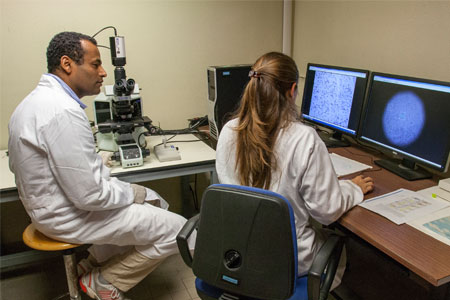- Autori:
-
Marra, A; Morganti, S; Pareja, F; Campanella, G; Bibeau, F; Fuchs, T; Loda, M; Parwani, A; Scarpa, A; Reis-Filho, J S; Curigliano, G; Marchiò, C; Kather, J N
- Titolo:
-
Artificial intelligence entering the pathology arena in oncology: current applications and future perspectives
- Anno:
-
2025
- Tipologia prodotto:
-
Articolo in Rivista
- Tipologia ANVUR:
- Articolo su rivista
- Lingua:
-
Inglese
- Referee:
-
No
- Nome rivista:
- Annals of Oncology
- ISSN Rivista:
- 0923-7534
- N° Volume:
-
36
- Numero o Fascicolo:
-
7
- Intervallo pagine:
-
712-725
- Parole chiave:
-
artificial intelligence; biomarkers; deep learning; oncology; pathology
- Breve descrizione dei contenuti:
- Background: Artificial intelligence (AI) is rapidly transforming the fields of pathology and oncology, offering novel opportunities for advancing diagnosis, prognosis, and treatment of cancer. Methods: Through a systematic review-based approach, the representatives from the European Society for Medical Oncology (ESMO) Precision Oncology Working Group (POWG) and international experts identified studies in pathology and oncology that applied AI-based algorithms for tumour diagnosis, molecular biomarker detection, and cancer prognosis assessment. These findings were synthesised to provide a comprehensive overview of current AI applications and future directions in cancer pathology. Results: The integration of AI tools in digital pathology is markedly improving the accuracy and efficiency of image analysis, allowing for automated tumour detection and classification, identification of prognostic molecular biomarkers, and prediction of treatment response and patient outcomes. Several barriers for the adoption of AI in clinical workflows, such as data availability, explainability, and regulatory considerations, still persist. There are currently no prognostic or predictive AI-based biomarkers supported by level IA or IB evidence. The ongoing advancements in AI algorithms, particularly foundation models, generalist models and transformer-based deep learning, offer immense promise for the future of cancer research and care. AI is also facilitating the integration of multi-omics data, leading to more precise patient stratification and personalised treatment strategies. Conclusions: The application of AI in pathology is poised to not only enhance the accuracy and efficiency of cancer diagnosis and prognosis but also facilitate the development of personalised treatment strategies. Although barriers to implementation remain, ongoing research and development in this field coupled with addressing ethical and regulatory considerations will likely lead to a future where AI plays an integral role in cancer management and precision medicine. The continued evolution and adoption of AI in pathology and oncology are anticipated to reshape the landscape of cancer care, heralding a new era of precision medicine and improved patient outcomes.
- Note:
- Epub 2025 Apr 29
- Id prodotto:
-
145495
- Handle IRIS:
-
11562/1161271
- ultima modifica:
-
21 agosto 2025
- Citazione bibliografica:
-
Marra, A; Morganti, S; Pareja, F; Campanella, G; Bibeau, F; Fuchs, T; Loda, M; Parwani, A; Scarpa, A; Reis-Filho, J S; Curigliano, G; Marchiò, C; Kather, J N,
Artificial intelligence entering the pathology arena in oncology: current applications and future perspectives
«Annals of Oncology»
, vol.
36
, n.
7
,
2025
,
pp. 712-725
Consulta la scheda completa presente nel
repository istituzionale della Ricerca di Ateneo 








